Part II
We left the next day. There was no need to break with the Ozeros over it in the end. Knyaz Ivan may have been the richest in the room, with the most subjects and the most cousins, but the tide was against him. The Pastukhovs—Knyaz Lev was not a man to shy from conflict, and it was already known where Knyaz Artyom and Gorakino stood. All Aksana had to do was flick her finger, and the whole house of cards came tumbling down.
It would take time to muster men and march miryanin troops in, but the other knyazes had brought their most crucial people with them.
We would descend on Veliko and tear apart the countryside like a plague of locusts. It would take far fewer of us than it would the locusts.
We split up to cover more ground, and messages flew like spitballs between camps, reporting what we’d found (usually nothing) and where we were going next. We carried goats with us, and then local livestock died by the dozens, then hundreds. We still didn’t know where Yelena Artyomovich was. The rebels had gone to ground quickly, but we couldn’t believe that they’d killed her. They had to know if they did that, every last one of them would burn.
If we ever found them.
Veliko was a golden country, all waving wheat fields and tawny grass packed with sharp little burrs that spread like wildfire. I found them everywhere: in my clothes, my hair, my shoes; I’d find them in my belongings even months after I left that sun-drenched, blood-soaked place.
We’d been in Veliko for two weeks with no luck when we came to a little town called Kineshma. The town’s khozyain, who oversaw it and two other nearby villages, came to meet us. He was a middle-aged man with a sleek black mustache and skin several shades paler than any of his dusty subjects. He said the same thing all the other hand-wringing khozyains we’d met said: they’d never seen any rebels, they’d never seen Yelena Artyomovich, there hadn’t been any strangers passing through or anything out of the ordinary happening at all. The whole village was praying to all the gods for Yelena Artyomovich’s safe return. We could take whatever we needed, of course, but…
I didn’t hear the end of the speech or witness the discussion that I knew was coming because as soon as they started talking, Dasha and I, along with most of the minor cousins brought along, fanned out and started to search the town.
In the middle of the day, most of the people were out in the fields, so the houses were empty or populated only by the elderly, small children, and, in one case, a heavily pregnant woman.
I tried to talk to any people we found inside, but though they were uniformly polite and offered us weak tea and whatever small bites they had around, their eyes were afraid, and they were not receptive to conversation. I’d try to joke, and they’d just stare at me hollowly or laugh too loudly.
I didn’t know what they were afraid of. We weren’t the insurgents, and I wasn’t going to hurt anyone unless I found Yelena Artyomovich tied up in a back room.
I was leading two minor cousins down a path that divided a wheat field from a cow pasture when I thought I saw movement in the field. It could’ve been crows; it could’ve been nothing. But when I looked, it was so still. I sent one disciple around the far side of the field and one to the close side, where the field backed up to a scrubby patch of trees along a creek bed.
I plunged in. The wheat was tall, up to my chest and nearly ready to harvest. It rustled when it parted around me, though I tried to move as quietly as possible, watching so my feet didn’t crunch the stalks. Myortva buzzed inside me like a beehive, itching to come out. Ahead of me, it was quiet, it was still.
Then a rustle, and then two heads and two pairs of shoulders burst from the wheat. The men were running full tilt towards the trees, and I chased, rush of giddiness to my head; I couldn’t have stopped myself pushing myortva into speed if I wanted. When I was within ten feet of them, I threw my hand out in front of me and pushed a wide wave of myortva out. Narrower, it could have shot a hole through one of them, but wide like that, it blasted both of them off their feet, throwing them forward onto their faces.
I had to skid to stop myself from tripping over them.
They were still breathing, but the concussive wave had knocked one out. The other was groaning and rolled over onto his back, bringing his hands up over his dirty face. I pulled them down and punched him, leaking myortva still, so his nose crumpled into his skull like a piece of paper and my knuckles came back dripping dark blood and mucous.
By then, the minor cousins had caught up with us, and one of them—Afanasij Aksanevich—pulled me back. “Don’t kill them,” he said, rubbing my shoulder. “We need to talk to them.” He was older, and it probably galled him to be led around by a teenage bastard, but he was always calm and collected. “You did good.”
“I wasn’t gonna kill them,” I said, drawing my hand across my face to wipe off the sweat pouring down before I remembered it was covered in gore.
“If you weren’t trying to, I hate to tell you…” That was Grigorij Aksanevich. He was crouched down by the men, his hand on the neck of the one I’d punched.
The giddiness that had still been bouncing around in my head drained, and the world was suddenly still again, the sound of the wind in the wheat the only noise. “What?”
“He’s dead,” Grigorij said, wiping his hand on his tunic.
Afanasij’s hand dropped from my shoulder, and he joined Grigorij.
“Oh well,” Grigorij said, squinting up at me with a look bordering on smugness. “The other one’s still alive. If you’d waited—”
“Grigorij Aksanevich, go tell the knyaz, and find Yuliya Aksanevich if you can.”
“I’m not supposed to leave—”
“Go do what he says,” I said.
Grigorij’s lip curled, but he went, wheat rattling behind him.
Afanasij took a length of rope from his belt and handed it to me. “Why don’t you tie this one up?” He jerked his head at the still-living man lying face down in the dirt.
I knew he was just trying to keep me busy, and I was supposed to be the one in charge, but I did it anyway.
“This happens sometimes,” he said, pulling the dead man away from me as I worked binding his living compatriot’s wrists. “You’re young, you’ve only really fought ghosts until now. It gets the best of you sometimes, the Tajna rush. Better to find that out on someone like this.”
I nodded. I got the knot right on the first try, and that eerie, sharp stillness dissipated. Hadn’t we come here to rain destruction on the cowards who thought they could touch one of us? There would be death. This was only the start of it, and maybe it was better that the first was out of the way. It had been simple. It had been so easy.
“Okay. C’mon, let me carry him, and we’ll go meet Knyaz Aksana.”
***
Afanasij didn’t need my help carrying one underfed man, but I wanted to give it anyway—it seemed undignified, somehow, to come strolling back, hands in my pockets—and he humored me.
Aksana met us at the head of the main thoroughfare in town.
The first thing she did before I even dropped the man’s feet was grab my head and give me a big kiss on the forehead. “Wonderful, Yushka, wonderful,” she said, ruffling my hair. “The khozyain has prepared for us a place to talk to this one. Yuliya Aksanevich will be able to bring him around.”
***
The place the town’s khozyain had prepared for us was the study of his own manor at the town’s high point. By the time we got there, it was mid-afternoon and the whole place was washed in amber light.
We tied the man to a chair—probably the nicest chair he’d ever sat in—and Yuliya put her hand on his head, brushing his hair back almost lovingly.
His eyes fluttered open, and he took a deep breath and promptly vomited all over himself and Yuliya.
Yuliya wiped the chunks from the side of her face and stepped back, nodding to Aksana.
Aksana squared herself, boots shoulder-width apart and hands clasped behind her back. “What is your name?”
The man was breathing heavily, still spitting bits of vomit and excess saliva. He acted like he didn’t hear her.
She stepped forward and put her finger on his chin, tilting his face up. “What is your name?”
His eyes wandered, swimming around the room before they met hers. “Fuck you,” he said.
Well, if there was any doubt he was one of them, that was gone.
Aksana didn’t react except to step back and nod to Yuliya.
There was a lot of nodding going on. I didn’t know what anyone meant by it; I’d never been in this situation. Dasha, at Semchik's left, looked fierce, like she belonged here. But Semchik, standing just in front of me, looked scared, uncertain. Quietly, I inched forward and squeezed his hand. I'd washed mine, earlier, so the dead man's blood no longer stained it.
Yuliya stepped behind the chair and put her hands on the man’s shoulders. They rested there silently for a moment before the man screamed.
***
In the end, Aksana got what we needed from him, though she didn’t bother asking his name again. I didn’t know why that stuck in my mind later, that she never got an answer to her first question. I’d never have a name to put to the face, either for him or the man laid out in the wheat field.
What we did have was the name of a town where the man had last seen Yelena Artyomovich, where he thought they might have been taking her, and a laundry list of other rebels’ names and descriptions. We wanted the name of their leader, but he insisted there wasn’t one at first. Pressed hard enough, he just repeated one of the names he’d already given: Pavel Viktorovich Polunin.
When we were done, Afanasij took the body out to burn it. Dasha had sent cousins to scour the fields and woods by the creek, and they found a campsite, but no evidence anyone other than the two men we’d already killed had been staying there. Aksana was suspicious that the townspeople and khozyain knew and were hiding them, but the camp out in the woods made it plausible enough for them to deny knowledge, though Dasha groused about “woods” being a very generous term for the smattering of trees down by the creek. After that, we sent messages to the other families and told them where we’d be going. In the morning, we’d slaughter livestock to drain before we set out.

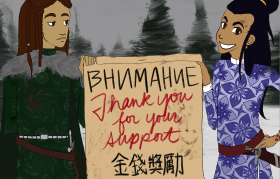
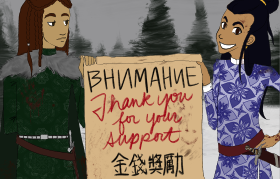
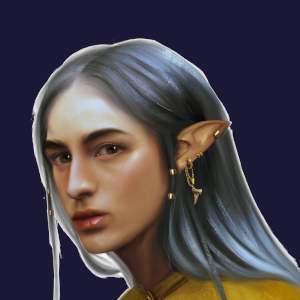
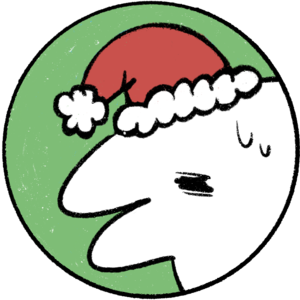







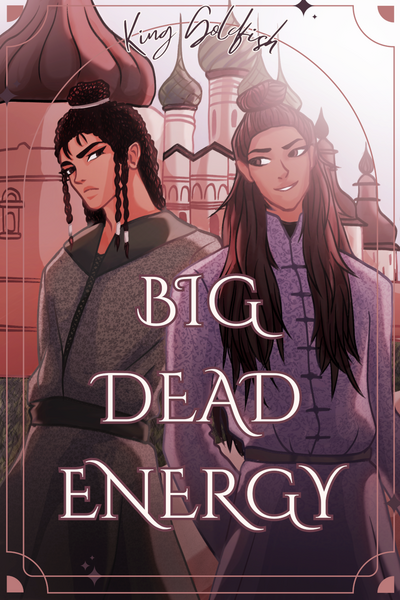
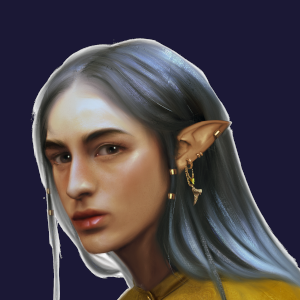
Comments (5)
See all